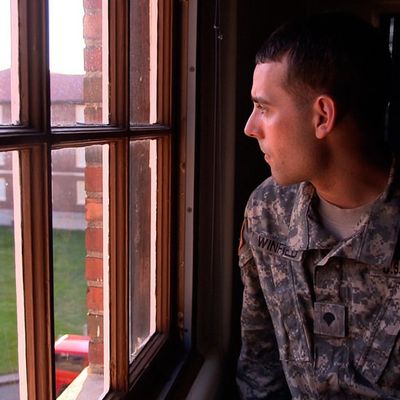
Many of us take the phrase “war is hell” to mean getting ripped apart by bullets or seeing other soldiers maimed or killed. But there’s another sort of “war is hell” story that centers not on what’s done to us, but on what — given license to kill and a broad sense of entitlement — we’re capable of doing (or watching get done) to someone else. That’s the hell at the heart of Dan Krauss’s inconsolably moving documentary The Kill Team, an essential film no matter what your political convictions. The setting is Afghanistan, but it might be Iraq or Vietnam or anywhere with occupying forces. It might be Gaza. This map of hell is timeless, placeless.
Krauss had amazing access to the central figure, Adam Winfield, a U.S. Army private who served in Afghanistan. In 2010, Winfield contacted his father, Christopher, by email. He couldn’t live, he said, with what he’d witnessed. His squadron leader, Staff Sergeant Calvin Gibbs, was in the habit of devising missions to kill Afghan civilians using the “drop-weapon” technique (shoot a guy, drop a gun next to him, say he shot first) or harmlessly exploding a grenade (“Grenade!”) and then pointing at some luckless passerby. The civilians (in one case, a teen) were easy to brand as “hostiles” in a war in which anyone could, indeed, be an enemy combatant. Gibbs had come from a tour in Iraq bearing tattoos representing, we’re told, “all the dudes he killed.” He severed a finger from each victim for a finger-bone necklace. He loved his job.
Sociopaths like Gibbs are mysterious, but they exist in all wars. The true horror was how easily he convinced others to participate. Gibbs isn’t interviewed (no surprise), but a former soldier with the evocative name Morlock is astonishingly frank. He speaks of “crippling boredom,” followed by a longing in this state of amorphous dread for an authority figure to tell him what to do — a vacuum into which Gibbs moved with alacrity. I suppose that in reaching out to his father, Winfield was looking for a similar authority figure. While Christopher Winfield (a former soldier) made calls to military officials who essentially blew him off, Adam learned from his squadron mates how easy it would be for Gibbs to make him vanish altogether. To ensure he wouldn’t tell, Gibbs put him at the front of the next kill-team excursion.
On trial for a crime he tried to expose, Winfield is — not to put too fine a point on it — a basket case. A relatively slight man, he labored to get into the Army, convinced that he could make a difference both to his country and to Afghan civilians. No doubt many U.S. soldiers have similar ideals, but they weren’t around to help him — or the men who were murdered. They aren’t around in the film. It’s just Adam, his dad and mom, and their relatively powerless lawyer against the might of the U.S. military. The man who blew the whistle is being prosecuted as a coward and a killer.
Watching The Kill Team, I thought of the last scene of Steven Spielberg and Tony Kushner’s Munich, in which the protagonist — an Israeli assassin — begs his superior officer to take him home for a Shabbas meal. He wants to be told that the terrible things he did were okay. He wants a father’s blessing. In a sense, The Kill Team is also about bad or absent fathers — leaders who drop men into a hell with no moral compass and then deny all responsibility. Morlock tells Krauss that the crimes of the kill team happen all the time, that he and his squad were just the ones who got caught. If that’s true, the men coming home are in even more trouble than we think. We have made it relatively easy for veterans with post-traumatic stress disorder to speak of the horrors to which they were subjected, but not of the horrors done by them or in their name. Where does that guilt go?
*This article appears in the July 28, 2014 issue of New York Magazine.


